- Home
- Aaron Allston
Outcast Page 8
Outcast Read online
Page 8
“Usually the Jedi does make a full statement. Does cooperate to whatever degree the local authorities require.”
“Usually, yes. I have a report here of a Jedi Knight named Seff Hellin who assaulted law officers just a few weeks ago. Whatever he needed to rush off to do, he never came back to offer full cooperation to the authorities. Did he?”
Luke suppressed the urge to fidget. He found himself wishing that Nawara Ven were here, though Daala was herself not being backed up by an advocate. “I can see how incomplete reports and investigations would be frustrating to the government. But you have to trust that we made the right choice at the right time. It’s what we’re trained to do.”
The smile she turned on him was as frosty as anything Luke had seen in the snowy outback of Hoth. “I do, do I? We’ll get back to that. Grand Master, the hypothetical incident I described shows at a very minor, very frequent level that the Jedi are above the law.”
“Not true. Anyone in the bar situation you described could have intervened with lethal force to save the victim from his beating.”
“And then would have been obliged to make a full report, and stay in contact until the investigation was resolved. The Jedi don’t respect that law, or any law they find inconvenient. And the choice to sever the arms comes dangerously close to a judicial sentence being enacted at the time of the intervention. Judge, jury, executioner: Jedi.”
“I’m sorry you have that impression.” Luke frowned. “I’d come here hoping that I could persuade you to drop the case. But now I’m wondering whether I should go through the whole trial just to demonstrate to the public that we do cooperate with the authorities. That we don’t consider ourselves above the law.”
Daala nodded, her expression agreeable. “Let’s talk about Kyp Durron.”
“Master Durron is a fine, responsible Jedi.”
“I’m not talking about the Jedi he is now. I’m talking about the teenager who destroyed most of the life in the Carida system all those years ago.”
Luke, his composure no longer entirely intact, shifted uncomfortably. “He was under the influence of the dark side of the Force at that time, affected by the mental sendings of a long-dead Sith Lord. And in the years since, he has proven himself to be courageous, a defender of life—”
“Yes, he has. I’m not questioning that. But I want to take you back a little over thirty years to shortly after he killed everyone who hadn’t yet managed to evacuate Carida in the two hours he generously gave the population. Of course, the solar system he destroyed was an Imperial system, your enemy at the time, which does mitigate his crime in your eyes. Is that why you protected him, shielded him from legal ramifications, trained him?”
“No.”
“Why did you?”
“Because I could look into his heart and see that he had cast the shadow of Exar Kun out, that he was no longer an agent of the dark side, that he had repented.”
“He said he was sorry, and he meant it, and that was sufficient justice for the millions who died on Carida.”
“You’re oversimplifying. I knew that he was on the right path again.”
“Because you have the power to see that. Because that’s what Jedi are trained to do.”
“Yes.”
Daala sighed. “And because they’re trained to do that, to see into people’s hearts, sort truth from lies, see into the future where the criminal has reformed and turned to a life of picking flowers, they can decide who should be thanked and who should be cut down, who should be forgiven and who should be left for the ordinary officers of the law to convict. They protect the common citizen but do not answer to him. They do not pay for their mistakes. They obey government orders when those orders conform to their moral code and not when they don’t. And that’s wrong. Any other group exhibiting that degree of arrogance, that unconcern for the rule of law, would be classified as a criminal organization. That, ultimately, is what this case is about.”
She was wrong. And yet she was chiefly wrong from the Jedi perspective. Remove the Force from the equation, and she suddenly became right. That was jarring to Luke. It was so hard for him now to remember what it was like not to have the Force always contributing to his decision making.
It was then that he detected it: the evil that the Force had brought him here to see. He did not see it as a person or an object, but as a process, a trend—one that he was a part of.
Understanding things as much as he could through Daala’s perspective, through the perspective of the common citizen, the one truth he could discern was that if the galaxy thought that the Jedi were above the law, abuses were sure to spring up from that notion as toxic weeds growing rapidly from a pile of manure.
Young Jedi, seeing the ease with which their Masters slid out from underneath common but inconvenient civic responsibilities, would come to think that such behavior was their right. A few, on the fringes of the border between the light side and the dark side, would discern that Kyp Durron had escaped any visible consequence of his actions at Carida … would accept Luke’s assertion that Darth Vader had been redeemed, had died a Jedi instead of a Sith despite his many murders, and would not understand the true meaning of the story.
The answer settled across Luke like a leaden shroud. To prevent this evil from growing, he had to lose this case, to be punished. That was what the Force had brought him here to understand.
He met Daala’s gaze again. “Will you be prosecuting Master Durron next?”
“I will not. But I could authorize extradition for him to the Imperial Remnant to face their charge of planetary genocide. Head of State Jagged Fel has rather reluctantly presented me with a proposal from the Moff Council on that very subject. But such a thing could be avoided, of course, if we had already set another decisive example.”
Luke gave her a slow nod. “I came here hoping that, face-to-face, without advocates whispering in our ears, we could negotiate a deal. Now, having heard what you have to say, I am certain we can.”
“Tell me.”
NINTH HALL OF JUSTICE, CORUSCANT
This really was a courtroom, a place where justice was Dispensed, and, during regimes like Jacen Solo’s, injustice as well. The walls were somber wood panel; the tables and the judge’s elevated bench were a dark, beautiful caf-colored antique marble from Ithor.
Luke watched the proceedings from a slight state of detachment, brought on by his lack of sleep and the air of unreality his own decision had created.
The judge, a severe-looking Falleen woman, her pale green skin contrasting sharply with her dark judicial robes, sat at her bench, studying the documents Nawara Ven and the government prosecutor had given her upon her arrival. The audience at the back of the chamber buzzed with a little conversation, and Luke could feel expectation from them far in excess of the level of noise. It was here, the first action in Luke Skywalker’s trial, and they were on hand to see blood spilled—metaphorically speaking.
Finally, the judge looked up, glanced at Luke and the two attorneys, and spoke. “In Alliance case why-oh-oh-four-three-dash-seven-teen thousand fourteen, The Galactic Federation of Free Alliances versus Luke Skywalker, we have a negotiated conclusion, agreed to this day by the prosecution, the defense, and myself.”
A faint moan arose from portions of the audience. Luke could sense the source of their dismay. Weeks of court hearings, stories of Jacen Solo’s murderous actions, embarrassing revelations, were all about to be headed off before they could take place in all their exploitation-news glory—wiped away by a plea bargain.
It should have been funny. But Luke didn’t feel in the least humorous.
“The defendant will stand.”
Luke and Nawara got to their feet.
“On the revised list of charges, now consisting of one charge, reckless endangerment of a population, how do you plead?”
Luke cleared his throat. “Guilty, Your Honor.”
“You are found guilty as charged. Please sit.” Once Luke and Nawara were seated,
she continued, “Thus ends the trial phase of these proceedings. We now move on to the sentencing phase.
“For a period of time, beginning tomorrow at one hour before midnight in the current time zone and continuing for not less than ten Coruscant years, you are exiled from Coruscant. You will maintain a distance of not less than five light-years from this world.
“During that same time period, you will not act as Grand Master of the Jedi Order, nor in any position of authority or consultation within the Order.
“During that same time, you will not visit or approach any closer than one light-year to any world upon which there exists a Jedi Order Temple, Jedi Order school, or any other Jedi Temple facility.
“During that same time, you will refrain from establishing any new Jedi Order Temple, Jedi Order school, or any other Jedi Temple facility, or any business that structurally or organizationally resembles those concerns and thus might readily be converted to such a concern after your sentence is fulfilled.
“You will appoint Jedi Master Kenth Hamner to perform the duties of leader of the Jedi Order, and will subsequently exercise no influence over him for the duration of your sentence.
“Any violation of the above restrictions incurs a more severe penalty: incarceration in an Alliance maximum-security prison facility for the remainder of the ten-year period.
“By the provisions of this arrangement, your sentence can be commuted or a pardon issued if you can convince a board of inquiry that you have determined the nature of the events and other causes that led to the aberrant and destructive behaviors of Colonel Jacen Solo leading up to and during the Second Galactic Civil War, the board of inquiry to be made up of one prominent member of each of the following: the Galactic Alliance Judiciary Branch, Galactic Alliance Medical Association, and Galactic Alliance Armed Forces, each of these individual members to be chosen by the Office of the Galactic Alliance Chief of State.
“Do you understand these terms?”
Luke nodded. “Yes, Your Honor.” He understood them very well. He and Daala had negotiated them, point for point, only hours before. But though he had played a part in selecting them, Luke still felt as though the situation were a dream that was sad and tiring.
“It is so ordered. The sentencing phase is complete, and, by my order, this case is concluded.” The judge stood, and all others in the chamber did as well to watch her leave by her private exit behind the bench.
When she was gone, the courtroom erupted into conversation, shouts, pleas from the members of the press for Luke to spare them a few words.
He kept his back to that portion of the chamber. Security troopers admitted members of the Jedi and Luke’s family into the area of the chamber reserved for advocates and their clients, and suddenly Luke was being embraced by Leia, Han, Ben, and Jaina, while other Jedi positioned themselves as a living wall between Luke and the audience.
“Ten years,” Ben said. He looked as though he’d been hit in the head by a speeder bike.
“We’ll fight this,” Leia told him.
“Kenth Hamner?” That was Han, looking confounded. “Was he chosen because he’s the dullest Jedi ever? He says two sentences and it puts Kowakian monkey-lizards to sleep.”
Luke addressed his sister’s comment first. “We won’t fight this. I negotiated it. I agreed to it.”
“Without benefit of counsel.” That was Nawara Ven, speaking under his breath, just loud enough for the Jedi to hear.
“And it won’t be the full ten years,” Luke told Ben. “You heard the conditions for commutation at the end.”
Han shook his head. “Buddy boy, Daala gets to appoint your tribunal. If they were still alive, she’d pick Palpatine, Lumiya, and Shimrra Jamaane to be your judges.”
Luke waved the objection away.
Captain Savar approached. He was in the GA Security dress uniform, his expression somber, perhaps even sad. “Judge Zudan left word that you could leave the courtroom by her door and the back corridors if you’d like to avoid the press.”
Luke nodded. “Please.”
“This way.”
That evening, Luke called a conference of the Jedi Masters’ Council.
“I’ll keep this brief,” he told them, “as I have a lot of preparations to make before tomorrow night, and in the interest of not drawing out an unpleasant event.
“First, I withdraw from my duties as Grand Master of the Jedi Order until such time as my sentence has been served, commuted, or struck down in the court. This is effective as of my departure from Coruscant.”
Kyp Durron smiled. “For the first time in this whole mess, you’ve given me some hope.”
Luke looked at him, curious. “How so?”
“You didn’t resign as Grand Master. Clearly, you plan to come back and resume your position.”
“I do. I hope to. So while I’m gone, there will be no wild parties in the Masters’ Chamber.” It felt good to be able to make a joke, even a stale one. “Second, I appoint Master Kenth Hamner as governing Master of the Order.”
Hamner, a tall, fair-haired man with features that spoke of generations of family wealth and rule, his posture military-perfect, offered Luke a wan smile. “And I did not even have the opportunity to negotiate before sentence was passed on me.”
“Chief of State Daala and the military have faith in you.” Luke gave him a sympathetic look. “Your own fault for leading a lifetime of military experience.”
“I will serve as best I can, Grand Master.”
Master Octa Ramis, recovered from the minor injuries she had sustained during Valin’s rampage, asked, “What are you going to do while you’re gone, Master Skywalker?”
“I plan to do what I negotiated with the Chief of State. To understand what brought Jacen to the dark side, and then set up protocols to anticipate the same thing happening in other Jedi. If we’re lucky, this may also have some bearing on what has happened to Valin and Seff. I’ll start by retracing, as much as I can, the travels Jacen undertook prior to the Killik crisis. I’m hoping that the answer lies somewhere along his journey.”
Master Hamner placed his hands together and peered over them at Luke. “Since that is distinctly to the Jedi Order’s benefit—even though you can’t advise us in any significant way until your sentence is concluded—and since the terms of your sentence do not come into effect for another day, I feel no guilt in offering you whatever resources you need to accomplish your mission. We just have to get them all transferred within a day.”
“I’ll be using Mara’s yacht as my main transportation and home. So travel is not an issue. But operating funds are; I don’t exactly have savings.”
Hamner nodded. “I’ll set up an account for you. Not a drawing account, as that would be proof of Jedi Order support after your sentence begins. A sum constituting forty-three standard years’ of back pay, I think.”
Luke smiled, amused. “And please, bank it out of some world that is not part of the Galactic Alliance, or likely to join it anytime soon.”
“Consider it done. You’ll have all the details in hand by breakfast.”
“That’s all I have to say.” Luke looked among the Masters. Sadness threatened to descend on him, to constrict his heart, but he kept it at bay by an act of will. “Any issues I need to address as Grand Master, you need to bring to me as soon as possible.”
Kyp Durron nodded. “We’ll sort it out.”
Cilghal was the first to rise. As she approached Luke, her action acted as a signal to the others, who all got to their feet. She enfolded Luke for a brief moment in her rubbery arms. “We will keep your home for your return,” she told him. “May the Force be with you, always and everywhere.”
Walking with Luke back to their quarters, Ben said, “I’m going with you.”
Luke managed another smile. “I don’t think so.”
“Why not?”
“Well, first, you’re not a convicted felon and don’t need to serve the sentence of one. Second, no teenager I ever knew, my
self included, could survive being in the constant company of a parent for ten years.”
“I have you on a point of logic.” Ben raised a finger, looking ridiculously like a Jedi Master addressing a roomful of younglings. “No teenager can remain one for ten years.”
“Conceded. Still, Ben, I think you should stay here.”
Ben’s jaw set. Now, as was often the case whenever his tendency toward stubbornness hit him, he truly resembled his mother. “You’re my Master, I’m your student.”
“You’re a full Jedi Knight now, even if there are plenty of places in the galaxy where you can’t legally vote or drink. Surely you didn’t forget your promotion. You only talked about it for two years.”
“I wasn’t that bad. And you’re a rank above Master, so you should have a student a rank above apprentice.”
“Interesting logic.”
“Dad, this is my mission, too.” Ben’s voice was suddenly no longer that of a wheedling teen. “I was Jacen’s apprentice. In the end, he tortured me, tried to make me a Sith. He killed Mom. Do you think I’m going to be able to rest, ever, without understanding why?”
Luke fell silent as he considered Ben’s words. Not speaking, they rode the turbolift down to the upper residential level. As they reached their door, Luke came to a decision. “You’re right. Pack up and make your farewells.”
Ben sagged in relief. “Thank you, Dad.”
The next morning, Luke reflected that one of the virtues of living as a Jedi was that packing was really easy. A lightsaber, a bag for a few changes of clothes, his kit of tools, parts, and meters for maintaining his artificial hand, a datapad stuffed with data and popular literature, and not only was he packed but his quarters were almost empty as well. He looked around his bedchamber and found it nearly bare; all that remained were shelf items, holos of his life with Mara, knick-knacks acquired during his years of travel or sent to him by admirers, a few articles of clothing he had decided to leave behind.
The thought that the room might remain empty, unchanged, for the entirety of his sentence—or that the room might be needed and reassigned, with the remainder of his things swept into a small bag and stored, scrubbing his presence out of the Temple like one last stain—was depressing. He had to go, and soon, and that fact alone was enough to make him want to stay.

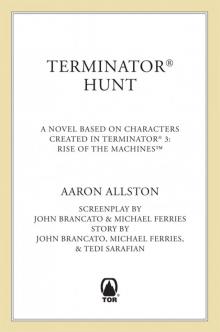 Terminator 3--Terminator Hunt
Terminator 3--Terminator Hunt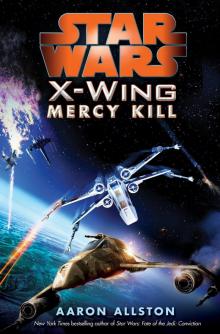 Mercy Kil
Mercy Kil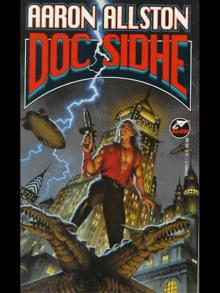 Doc Sidhe
Doc Sidhe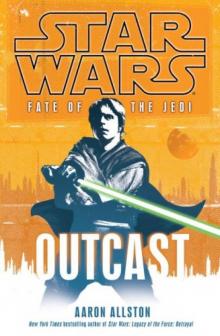 Star Wars: Fate of the Jedi: Outcast
Star Wars: Fate of the Jedi: Outcast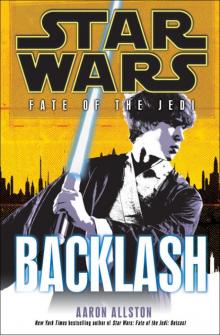 Fate of the Jedi: Backlash
Fate of the Jedi: Backlash Mercy Kill
Mercy Kill Rebel Stand
Rebel Stand Wraith Squadron
Wraith Squadron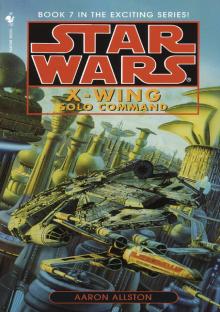 Star Wars: X-Wing VII: Solo Command
Star Wars: X-Wing VII: Solo Command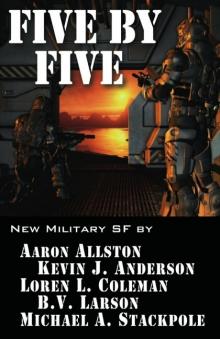 Five by Five
Five by Five Solo Command
Solo Command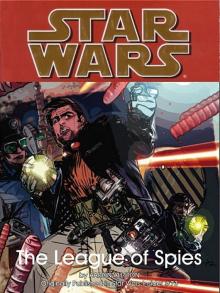 Star Wars: The Clone Wars Short Stories: The League of Spies
Star Wars: The Clone Wars Short Stories: The League of Spies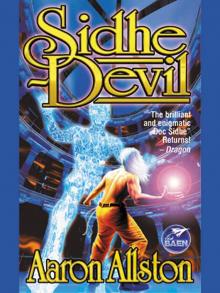 Sidhe-Devil
Sidhe-Devil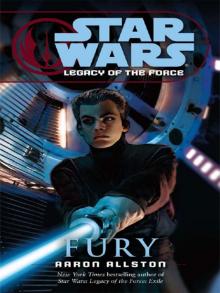 Star Wars: Legacy of the Force: Fury
Star Wars: Legacy of the Force: Fury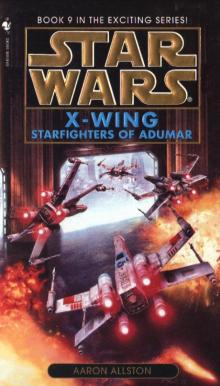 Starfighters of Adumar
Starfighters of Adumar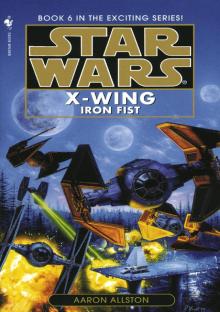 Star Wars: X-Wing VI: Iron Fist
Star Wars: X-Wing VI: Iron Fist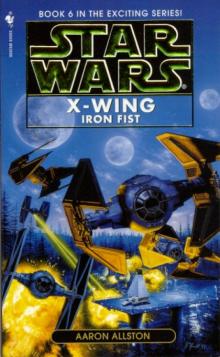 Star Wars - X-Wing - Iron Fist
Star Wars - X-Wing - Iron Fist Exile
Exile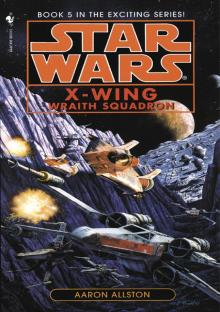 Star Wars: X-Wing V: Wraith Squadron
Star Wars: X-Wing V: Wraith Squadron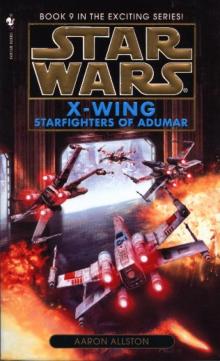 Star Wars - X-Wing - Starfighters of Adumar
Star Wars - X-Wing - Starfighters of Adumar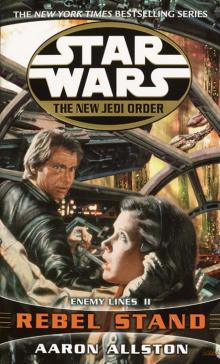 Rebel Stand: Enemy Lines II
Rebel Stand: Enemy Lines II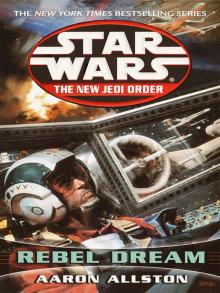 Rebel Dream: Enemy Lines I
Rebel Dream: Enemy Lines I Outcast
Outcast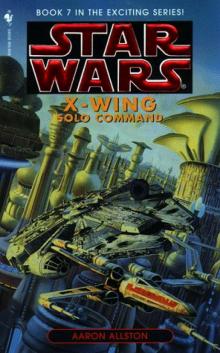 Star Wars - X-Wing 07 - Solo Command
Star Wars - X-Wing 07 - Solo Command